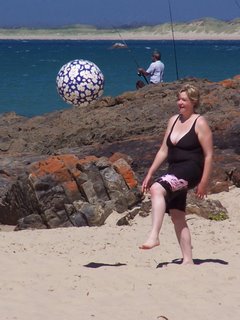
A Tasmanian woman clad in Supre combines military drill training with seaside activities, goose-stepping across the beach at a popular coastal resort. Until recently, national security experts at ANU believed that the prevalence of camouflage prints and khaki shades among Supre’s ‘southern summer range’ was a reliable gauge of Tasmania’s military aspirations. PGC can now reveal that the emphasis on blacks, corals and board shorts points to a new era of amphibious warfare.
The first evidence of Tasmania’s extreme isolationist policies came almost immediately as PGC emerged from Hobart airport, exhausted from relentless interrogation by intelligence officers who demanded to know if we had any fruit or vegetables we wished to dispose of before proceeding to the baggage collection area. Luckily, PGC had been warned in advance that such a request might be made, and had secreted a large stash of prunes in our boogie board bag before leaving Canberra. Such is the jealous fervour with which Tasmania guards its agrarian economy, it frequently rejects offers of international aid under the flimsy excuse of ‘quarantine.’

Border security - Tasmanian style. An expertly trained sniffer-Devil causes PGC angst at Hobart airport, lingering over our photographic equipment until a bribe of a free Qantas headset is offered to his handler. Then, in an amusing display of playfulness, the sniffer-Devil poses for a photograph with PGC. We understand that the devil was arrested shortly afterwards for fraternising with imperialist invaders and emulating Inspector Rex. His fate is unknown.
Criticised by many as an ostentatious display of culinary might designed to intimidate foreign visitors, the Taste of Tasmania showcases the finest tidbits of this quaint agrarian culture every year in a large barnyard situated in the demilitarised zone near the city centre. Peasants, workers and intellectuals mingle freely as they queue up to receive their rations of shitake mushroom pizza, Thai-crusted scallops and raspberry brulee. PGC was not to be fooled, however, by the rustic charm of the maritime setting, nor the unseasonally fine weather. As temperatures soared towards a searing 16°C, PGC’s attention was drawn to the ominous signs of political repression, demonstrated most poignantly by signs announcing the state-wide prohibition on slouching.
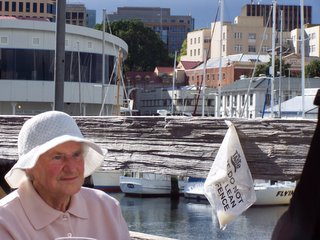
In a typical example of over-zealous state control on posture, signs prohibiting leaning against wooden structures appear throughout the festival venue. When PGC approached this Hobart local for comment, she refused to respond. PGC later learned that this woman was aged 25.
It is entirely possible that this woman had only recently been released from one of the many prison farms dotted throughout the country-side. Readers will not be surprised to learn that it has suspected for decades that political dissent is controlled in Tasmania by deporting suspected dissidents to rural locations for agrarian re-education. As PGC discovered, religious advocates, disgraced former athletes and disaffected journalists are more than likely responsible for producing some of the state’s most celebrated wines, compotes and soft cheeses.
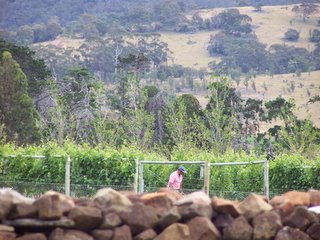
PGC snatches a rare glimpse of a Tasmanian labour camp, where a middle aged man - a former university professor perhaps - places his life in danger by toiling diligently beneath a known ozone hole.
Those accused of more serious crimes against the state share a more ominous fate: forced participation in an alternative lifestyle retreat. Here, citizens suspected of posing an immediate threat to the leadership are isolated and purged of their ‘disloyalties’ in a controlled setting.
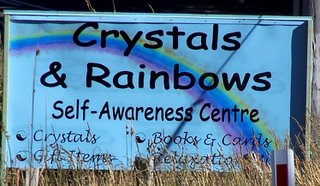
Information from Tasmanians who have managed to escape to the mainland after release from such institutions say inmates are subjected to punishing meditation regimes, exposed to dangerous auras and used as guinea pigs in controversial medical experiments involving kinesiology and interpretive dance.
Despite the ever present risk of arrest for leaning in a public place, Tasmanians continue to converge in their thousands on their capital city each year in a desperate attempt to impress their remote, laconic leader. PGC is unable to speculate why this is so. Brainwashing, say some analysts. Other commentators point to the ever present threat of deportation to a Crystals and Rainbows or, alternately, compulsory participation in ghost tours of Port Arthur.
The more likely answer, as far as PGC is concerned, is the tremendous charisma radiated by the Great Leader, Premier Paul Lennon, and his ability to mobilise vast sectors of the population with his boyish good looks and magnetic, paternal gaze.
Cult of the personalityBillboards depicting grainy images of Premier Lennon, or the Great Leader as he is affectionately known by Tasmanians, adorned the roads leading from the airport into Hobart and featured prominently at sea passenger terminals in Burnie and Devonport. PGC understands that the giant red placards, which do not name Premier Lennon, but feature a "washout" image of his face looking dark and somewhat menacing, must be removed in the event that permission for their use is withdrawn by the Great Leader, under the strict rules of the Hare-Clark electoral system.
Great Leader - The Hon Paul Lennon MHA was sworn in as Tasmania’s 42nd Premier on 21 March 2004. Premier Lennon, feared and admired by his constituents, marks his birthday every year by a state-wide holiday: an event for which Tasmanians commence preparing up to 12 months in advance.
Famine
The Great Leader’s stubborn insistence on the policy of ‘self-reliance’ is hindering attempts to diversify and develop the economy. Residents in rural areas are the most likely to suffer from food shortages due to bizarre agricultural policies during the 1990s that led to an over-reliance on gourmet foodstuffs, craft and pottery. ‘There’s only so much marinated feta and Anvers fudge your body can handle,’ PGC was told by a peasant labourer from the state’s southern provinces, who did not wish to be named. ‘After a while, you become so desperate you’ll consider eating almost anything just to get some variety into your diet.’ An Amnesty International spokesperson reported that this was a familiar scenario: ‘There are rumours of people in the remote southern highlands resorting to eating quince paste on plain water crackers. Our sources say that supplies of poppy seeds in the area are almost completely exhausted – although the government refuses to confirm or deny this.’ PGC was disturbed to learn that the food security situation is set to worsen over the coming winter. According to aid agencies and human rights advocates, production targets of staple food items such as leatherwood honey, truffles and smoked salmon are set to plummet despite desperate pleas by farmers for government assistance.
Pitiful offerings of aged Gewurztraminer and Pinot Gris characterise the typical Tasmanian diet, which WHO officials believe may be placing the population at risk of malnutrition.
Although PGC had braced ourselves for evidence of starvation, nothing could have prepared us for the scenes of depravity in the garment and footwear industries. The more squeamish among you should be warned that the following image contains signs of animal cruelty:
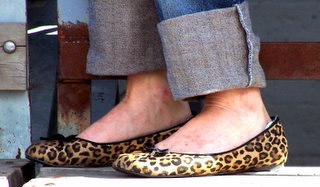
Young Tasmanian women resort to poaching Tasmanian tigers and fashioning primitive footwear out of their skins.
It would be all too easy to cast judgment on the citizens of Tasmania for their deplorable behaviour (although it would answer a few questions about the cause of the tiger’s extinction) and PGC resisted the temptation. After all, similar tales of wardrobe scavenging are common among reports by human rights activists and expatriates living abroad in exile. Harsh restrictions on fashion retailing triggered a resurgence in handicraft during the arduous march of the 1990s. But this trend appears to have been replaced by an even more sinister form of repression: Supre. Throughout the farthest reaches of this tiny island State, PGC found disturbing evidence of gratuitous accessorising, tasteless flounce and shameless short-shorts (apparently, a response to fabric rationing). A harmless coincidence? Or chilling example of totalitarian conformity?
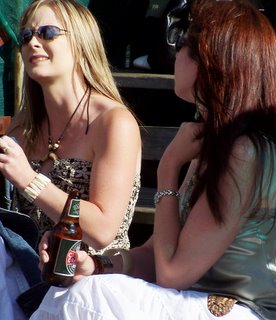 Members of Hobart’s gilded youth bask in the sunshine, blissfully unaware of the autocratic power structure dictating their wardrobe options.
Members of Hobart’s gilded youth bask in the sunshine, blissfully unaware of the autocratic power structure dictating their wardrobe options.
But the decaying grandeur of this orbiting satellite state was not lost of PGC – although the 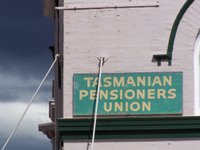 standard of accommodation was slightly below what we are accustomed to in Canberra. Nevertheless, after a few days in Hobart, PGC began to be seduced by the thin veneer of egalitarian bliss coating the state’s fine architecture: a dim reminder of the cradle-to-grave security so familiar to us as long-time residents of Canberra.
standard of accommodation was slightly below what we are accustomed to in Canberra. Nevertheless, after a few days in Hobart, PGC began to be seduced by the thin veneer of egalitarian bliss coating the state’s fine architecture: a dim reminder of the cradle-to-grave security so familiar to us as long-time residents of Canberra.
While the paranoid state claims to support freedom of association, membership of state-sanctioned organisations is widely regarded as essential for political and personal advancement.
As PGC edged further and further away from the city centre, opportunities to observe citizens in a less contrived environment became increasingly frequent. PGC visited a typical bookshop in the northern part of the capital. Here, we found jittery Hobartians perusing the shelves, desperate to gather any scraps of information about the outside world that may have escaped the attention of the censors.
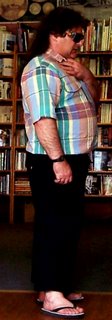 In a typical nervous gesture, our subject wears dark glasses to evade recognition by neighbours, children and other informants as he scans the titles on offer, lending credence to the popular saying that in the book shops of Hobart, even the walls have hidden cameras.
In a typical nervous gesture, our subject wears dark glasses to evade recognition by neighbours, children and other informants as he scans the titles on offer, lending credence to the popular saying that in the book shops of Hobart, even the walls have hidden cameras.
Geopolitical Tensions
According to PGC’s sources, security analysts aver that the biggest test of Melbourne-Hobart realpolitik in 2006 may be airport and maritime security in the northern seaports of Burnie and Devonport, as Victoria attempts to stem the illegal migration of Tasmanians to mainland Australia. Official government documents – suppressed until now – describe the increasingly desperate tactics used by asylum seekers to reach Victorian territorial waters and recommend that security be increased at all northern points of international departure.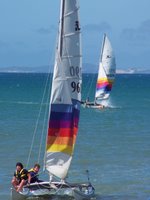 A father and son make a frantic dash for freedom in a hastily assembled catamaran, ill-suited to the choppy conditions of Bass Strait. Dreams of a better life in Victoria spur thousands of Tasmanians to attempt this method of escape every year - few survive the crossing. Analysts from mainland think-tanks suspect that the Sydney to Hobart yacht race has inspired many locals to undertake the perilous journey.
A father and son make a frantic dash for freedom in a hastily assembled catamaran, ill-suited to the choppy conditions of Bass Strait. Dreams of a better life in Victoria spur thousands of Tasmanians to attempt this method of escape every year - few survive the crossing. Analysts from mainland think-tanks suspect that the Sydney to Hobart yacht race has inspired many locals to undertake the perilous journey.

The heavily guarded seaport of Bridport is just one such example of the regime’s determination to fortify the passenger terminal and prevent the flow of would-be defectors across the maritime border. PGC was denied access to the interior of this austere military installation and was asked to leave the area shortly after this photograph was taken.

4 comments:
An extremely accurate analysis of the existing political situation in Tasmania. Good to see someone tell it like it is. Time for all people who love 'peace and freedom' to take a stand against the terrorists of tasmani.
Interestng to read your perceptions of paradise. Some people have imigrated from other parts of the world to enjoy the pristine environment and hassle free living. Bridport is a delightful seaside village of 1200 people, but thousands enjoy its safe swimming beaches every summer. The sailing club kiosk depicted in your pictures of a fortress, is the only way the club has of raising funds for its cash strapped group.
Please give consideration to the local community when you are visiting and making comment.
It may be amusing to some to denergate a community club for having a go.
I suggest if you cannot appreciate a local community then don't go on holiday. If you think you live in the best place and have the best life style then leave others to enjoy theirs.
The locals would not appreciate photos being posted publically without permission I would be very careful next time you try this sort of stunt anywhere.
Tinman.
Dear Tinman
We are well aware of Australia's immigration policy and the delights that this country has to offer people from "other parts of the world".
We think you failed to notice that our trip to Tasmania posting was a satirical look on Tasmania. It is obvious from the photographs we use that we believe it is a beautiful place and that Bridport IS a delightful seaside village.
You would be pleased to note that we made a purchase at the sailing club kiosk, greatly helping this cash strapped group. We certainly did not wish to denigrate the sailing club.
We have certainly not denigrated any community club for having a go.
If you had taken the time to read the rest of PopGoesCanberra, you would have found that we think the place we live is pretty awful. We believe Bridport and Tasmania, if you had read between the lines of our satirical article, actually compares very favourably with Canberra in the beauty, friendly people, food and wine stakes.
We do not appreciate your threat. We were actually planning to come to Bridport and donate several thousand dollars to the local sailing club, stay in local accommodation and spend lots of money. We have now changed our mind.
Congratulations on this hilarious and brilliant satirical analysis demonstrating the political-dialectic powerhouse which is the Institute of Canberra Pop Studies. Clearly the reactionist rhetoric emerging from obviously government-controlled commentators inside Tasmania reflects the strong control of the neo-Marxist-Lennonist regime in their desperation and paranoia. I hope this piece sheds some light on the struggles of the Taswegian people to escape the clutches of totalitarian boutique niche tourism and find freedom among advanced western democracies. By the way, may I suggest you next conduct a thorough investigation of the sad struggle for survival amidst oppressive social tension and an environmental crisis of desertification and food insecurity of the sub-Saharan state of South Australia.
Post a Comment